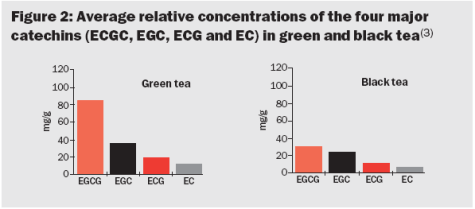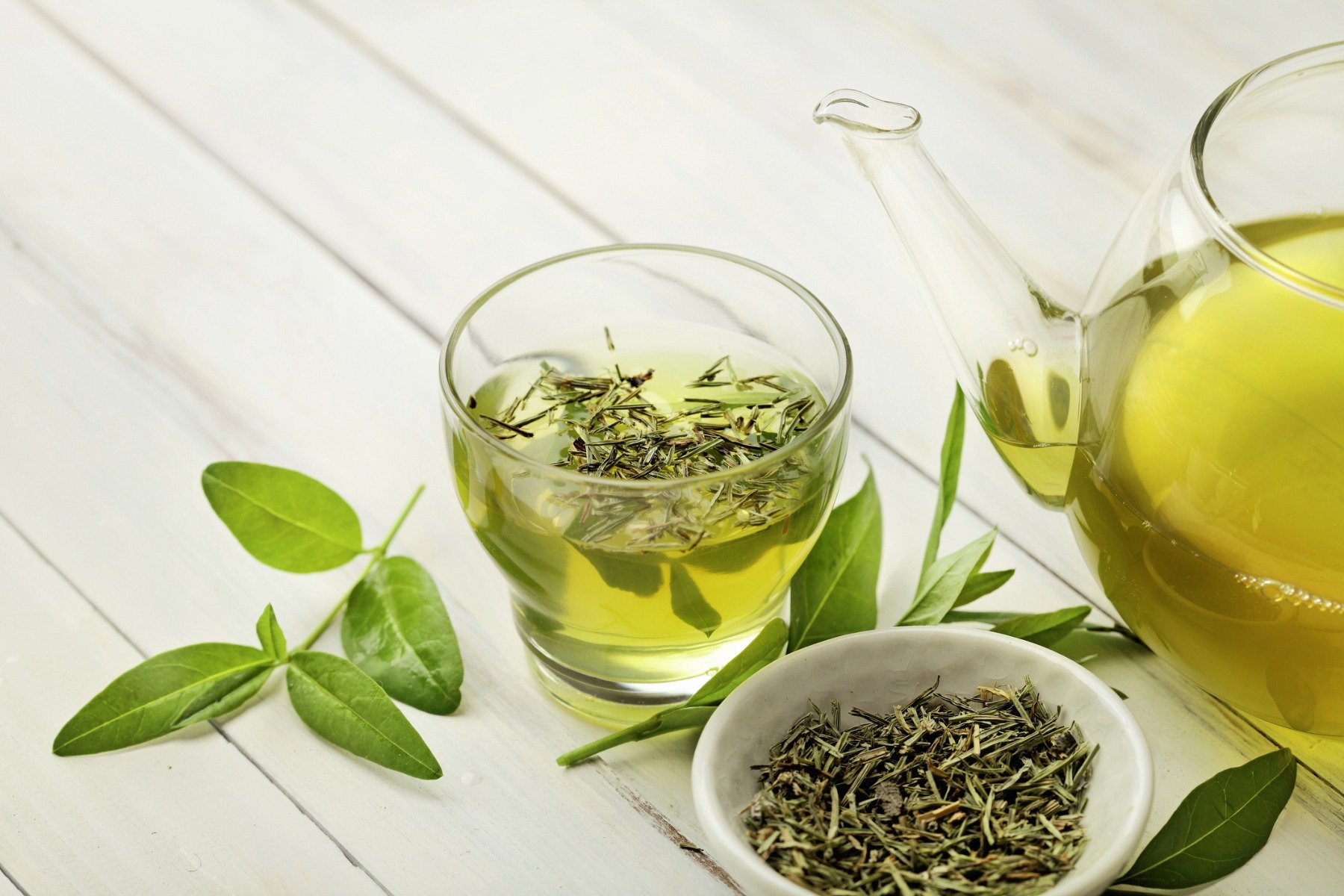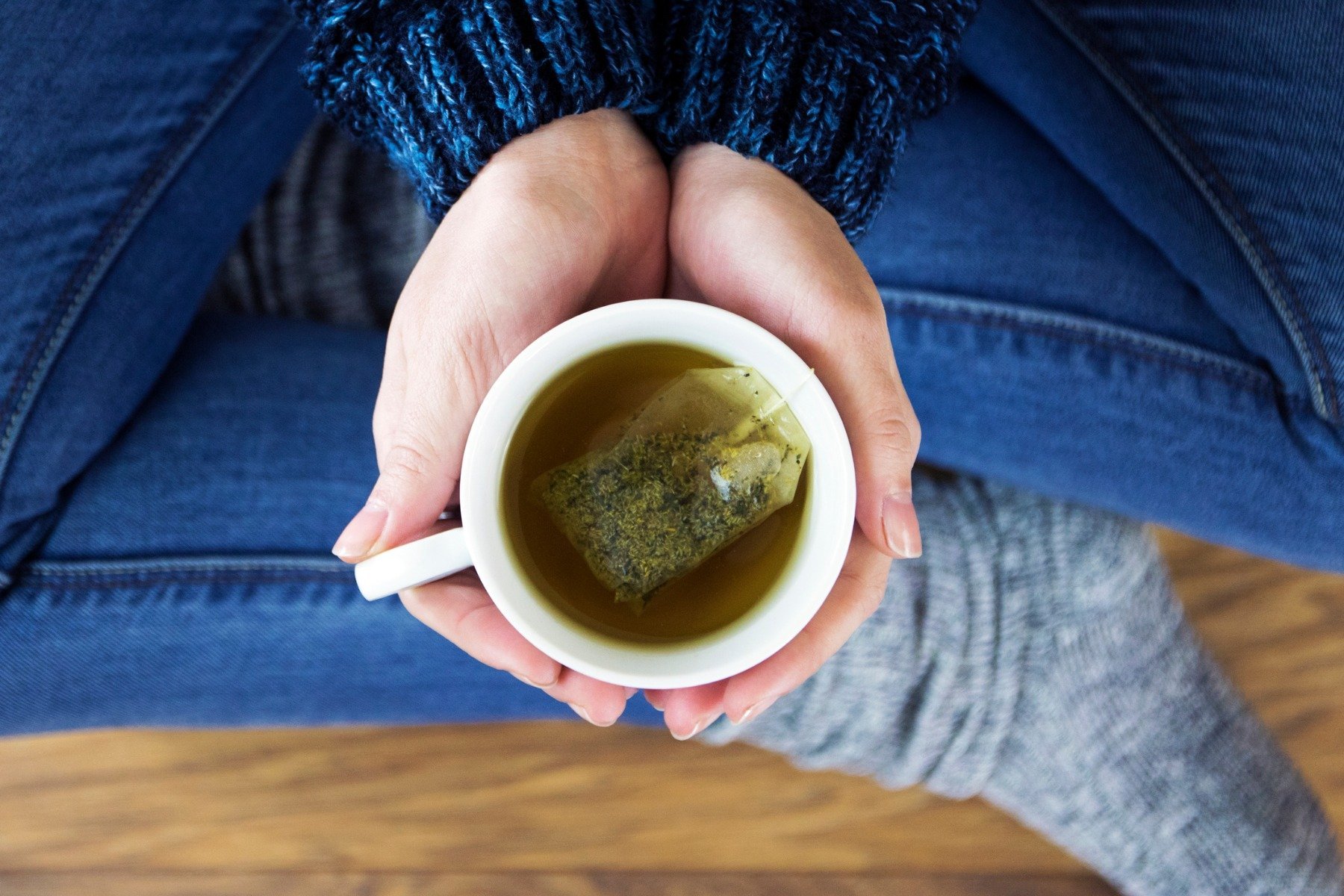Table of Contents
Green tea has long been one of the world’s most popular and beloved hot beverages. It comes from China, where for 2000 years, it is one of the most sought after beverages, right after water. Recently, however, it has found its place on the nutritional supplements market as a Green Tea in the form of green tea leaf extract. Given its widespread consumption, it is no wonder that green tea has undergone several studies that have confirmed its effects on better health. You can find out all about the source, composition, benefits and forms of green tea in the article.
Sources of green tea
Green tea has many beneficial effects that come from its composition. Primarily effective are the catechin substances that green tea contains. They come mainly from two sources:
- tea leaves of Camellia Sinensis that is used to prepare white, green, Oolong and black tea
- Chungtaejeon tea, or Korean fermented tea, which contains less catechins but has a higher antioxidant potential [2]

However, most commonly available tea comes from the leaves of Camelia Sinensis. [1] It is used to make green and black tea. The difference between them lies in the way they are prepared. That is:
- non-fermented green tea, which is produced by drying and steaming fresh leaves to deactivate enzymes called polyphenols. This helps prevent the oxidation and fermentation of some key compounds in tea that have positive health effects.
- fermented black tea, goes through the entire fermentation stage before drying and steaming. This leads to markedly increased oxidation and subsequent reduction of the final concentration of some key medical substances. [2]
Green tea’s composition
Green tea, in contrast to black tea, has a high content of naturally occurring strong antioxidants – polyphenols. Specifically, their most widespread group of flavenoid compounds. There are many kinds of flavenoids, but in green tea there is mainly high concentration of catechins. They are beneficient for almost every organ in the body. They protect the heart, nervous system and fight obesity. They are also anti-carcinogenic, antidiabetic as well as help the liver and blood vessels. All these positive effects are related to drinking green tea or taking it in the form of green tea supplements. [2]
In particular, green tea catechins are [5] [2]:
- epigallocatechin-3-gallate EGCG – approximately 59% of total catechin content
- epigallacatechin EGC – approx. 19%
- epicatechin-3- gallate ECG – approx. 13%
- epicatechin EC – approx. 6,4%
Although all catechins share similar properties, EGCG appears to be the most effective of them. [2] The exact content and ratio of catechins depends on the way the tea is processed. The ratio of green and black tea catechins can be seen in the picture. In particular, note the significantly higher ECGC content in green tea, as opposed to black tea. [2]

In addition to these catechins, green tea is nutritionally very rich. It contains caffeine, theanine, vitamins (C, B2, E), beta carotene, folic acid, saponins, gamma-aminobutyric acids GABA, minerals such as potassium, calcium, phosphorus, manganese and chlorophyll. [4] The presence of caffeine in green tea depends on the manufacturer. However, this is lesser amount of caffeine than in coffee. One cup of green tea contains about 35 – 80 mg, while for a cup of coffee the amount is 100 – 400 mg of caffeine. Green tea supplements contain about 50 mg of caffeine. Nevertheless, green tea can act as a stimulant, so it works as a pick-me-up for some people, giving them energy, concentration and improving their mood. However, this is a very individual effect. [6] If you are sensitive to caffeine, we recommend limiting your overall green tea intake during the day. Too much caffeine can disrupt your sleep, so intake of green tea is recommended especially in the morning hours.
Whether you consume green tea as a hot beverage or take it as a supplement, it has the same effects. Unless the taste is concerned. Green tea is characterized by a pleasant sweet herbal taste. However, if you soak the tea bag longer than necessary, it releases theanine, which causes a bitter taste. Eventually, it does not affect its effects. [1]
You might be interested in these products:
8 benefits of green tea consumption
Almost everyone has heard about the positive effects of green tea. It is a powerful antioxidant that can successfully promote health and immunity and also serve as a prevention. Learn more about the benefits of green tea in the following eight points. According to experts, the difference between beverage and Green Tea supplements is minimal to none. [1] It is therefore up to you what form of consumption you choose. If you can’t imagine drinking 3 or more cups of tea per day, we suggest you to try a supplement.
1. Supports weight reduction
Green tea is probably one of the best known weight loss aids. Studies also confirm that it is a good means of reducing fat, whether in the form of liquid tea or supplements.

If we take a look at long-term research, they found that intake of green tea is directly proportional to weight and fat reduction. One study found that green tea catechins caused a weight loss of 1.22 kg in 90 days at a daily dose of 886 mg. This result was achieved without physical activity. [9]
If you add exercise to your green tea supplementation, you will promote weight loss effect thus lose more weight. In combination with exercise, green tea catechins are associated with a loss of 2.2 kg of body weight in obese persons during a 12-week training program. [10]
One study also claims that each 200 ml cup of green tea (or a supplement serving containing 235 mg of catechins and 30 mg of caffeine) can burn 5.7 g of body fat. [11]
2. Increases aerobic activity
A study of which subjects were inactive healthy young men showed that 570 mg of green tea catechins containing 218 mg of EGCG and 15 mg of caffeine increased aerobic endurance in the test subjects. [12] Green tea has proven to be effective in aerobic capacity when used by sedentary or inactive people. This effect has not been studied in professional athletes.
3. Promotes immunity and has an anti-inflammatory effect
Green tea catechins also have many health benefits as far as immunity is concerned. Some studies have shown that they can kill bacteria and suppress viruses such as the influenza virus. Thus, the consumption of green tea prevents the risk of disease and infection. [14] [15] [16] [17]
Studies also confirm that green tea can reduce bad breath. [21]

4. Green tea may reduce the risk of Type 2 diabetes
Type 2 diabetes is a disease that causes elevated blood sugar levels due to insulin resistance or the inability to produce insulin. It is a disease that has reached epidemic proportions in recent decades and has affected some 400 million people worldwide. [13]
Studies confirm that green tea can increase insulin sensitivity and lower blood sugar. [26] One study also found that people who drank green tea had a 42% lower risk of developing Type 2 diabetes. [27] According to 7 studies with a total of 286,701 people tested, green tea supplementation reduced the risk of developing diabetes by 18%. [28]
5. Prevents cardiovascular diseases
Green tea has a beneficial effect on several of the risk factors for cardiovascular disease. Research has confirmed that green tea lowers LDL cholesterol and triglyceride levels. [29]
Green tea can also significantly increase the antioxidant capacity of blood, which protects LDL particles from oxidation, a phenomenon that is a common cause of heart disease. [30] Taking into account these positive factors, the study confirms that green tea intake reduces the risk of cardiovascular disease by up to 31%. [31] [32]

6. It may help you to live longer
Thanks to the above-mentioned effects of green tea against cardiovascular diseases, drinking a beverage or taking a green tea supplement can ensure a longer life. Of course, this is largely an individual claim and depends on several factors. [33]
However, a study on 40,530 Japanese adults confirmed that those who drank green tea of 5 or more cups a day were, over a period of 11 years, less likely to die from death caused by [34]:
- any disease – 23% less risk in women and 12% less in men
- cardiovascular disorder – 31% less risk in women and 22% in men
- stroke – 42% less risk in women and 35% in men
Another study on 14,001 older Japanese residents found that those consuming green tea had a 76% lower risk of death over a 6-year period. [35]
7. Prevents certain types of cancer
Cancer is caused by uncontrolled cell growth and is currently one of the most widespread fatal diseases. It is known that oxidative damage contributes to the development of cancer and that antioxidants can have a protective effect against this phenomenon. [36]

Green tea, as an excellent source of antioxidants, can serve to prevent cancer. Studies have reported results for cancer types such as:
- breast cancer – the study confirmed that women who drank green tea had a 20-30% lower risk of breast cancer, the most common cancer in women [37]
- prostate cancer – one research has found that men consuming green tea were 48% less likely to develop prostate cancer, the most common cancer in men [38]
- colorectal cancer – an analysis of 29 studies has shown that people who consume green tea are 42% less likely to develop colorectal cancer [39]
Many studies have also confirmed that green tea consumers have less chance of developing several types of cancer. However, further high-quality long-term research and scientific studies still need to be submitted to confirm these effects. [40] [41]
8. Supports learning and memory
The content of caffeine in green tea is exactly the dose that will kick the body without the unpleasant side effects of caffeine. A moderate dose of caffeine, as shown by studies, has many effects of promoting brain activity, including improving mood, alertness, reaction time and memory. [22] [23] Many people also like the stimulating effects of green tea. They say it provides them with a higher dose of energy than coffee. In addition, according to studies, the combination of a small dose of caffeine and the amino acid L-theanine is particularly effective in improving brain activity. At the same time, L-theanine increases dopamine levels and alpha wave production in the brain. [24] [25]

Recommended daily use of green tea
Studies that describe the beneficial effects of green tea do not clearly agree as far as the optimal daily dose is concerned. Some recommend drinking only a cup a day or taking one green tea tablet, other work with data such as 5 or more cups a day. [42] [43] The optimal dose also varies based on the results you want to achieve and what disease you need to alleviate.
Optimal doses are:
- high cholesterol: Green tea or green tea extract containing 150 to 2500 mg of catechins taken daily for 24 weeks. [3]
- for high blood pressure, it is recommended to soak 3 grams of green tea in 150 ml of water three times a day, about 2 hours after a meal, for 4 weeks. You can also daily use 379 mg of green tea extract for 3 months. [3]
- for heart diseases, the analysis of 9 studies recommend drinking from one to three cups of green tea per day as well as taking the same amount in the form of supplements. This dose is effective to reduce the risk of heart attack or stroke.[20]
- for gum problems, it is recommended to take 3 grams of green tea in the form of tablets while applying the extract to white spots on the gums for 6 months. [3]
- for low pressure experts recommend drinking 400 ml of green tea before lunch. [3]
- for weight loss and weight reduction, high doses of green tea, around 400-500 mg EGCG daily, have been shown to be effective. The effect of a fat burner also depends on not taking too much caffeine during the day. [1]
- for cancer prevetion, it is ideal to take all catechins as green tea extract. The minimum dose should be 200 mg or more, 3 times a day. However, it should be remembered that high doses of green tea and caffeine can cause nausea. [1]
Studies show that the maximum dose of green tea ranges from 3 to 5 cups per day and for green tea supplements you can find the recommended dose on the package. However, it is very individual how your body responds to a higher dose of green tea. Therefore, if you want to lose weight with the help of green tea or to alleviate the disease, always consult a specialist. This can avoid unpleasant side effects.

Side effects of green tea
Green tea is usually safe for healthy adults if consumed responsibly. Green tea extract generally does not cause any side effects, even when taken orally or applied on the skin.
However, if you exceed the recommended dose and overdose with green tea, you are at risk of side effects from caffeine, theanine and catechins. These may be some of the following [7]:
- headache
- nervousness
- sleep problems
- vomiting or heartburn
- increased heartbeat
Theanine in green tea increases stomach acid production, which can cause abdominal pain, nausea and constipation. [7]

Therefore, people suffering from the following problems should avoid green tea [7] [1]:
- digestive problems
- iron deficiency or anemia
- anxiety and depression
- heart problems
Pregnant and breastfeeding women should also pay attention. These two groups can drink a maximum of 1 to 2 cups of green tea per day. Caffeine, catechins and tannins have proved to be risky during pregnancy. Larger amounts of green tea can cause miscarriage or the above-mentioned side effects. When breast-feeding, caffeine can affect the baby’s behavior through breast milk. For this reason, green tea is not recommended for children at all. [7]

Green tea and its effects with medicines and substances
Green tea in combination with certain medicines and substances can cause serious health problems. You should not combine it with [3] [7]:
- stimulants such as amphetamines or ephedrine
- addictive substances such as cocaine and nicotine
You should also take care when combining green tea with substances and medicines such as [3]:
- adenosine
- antibiotics
- contraception
- oestrogens
- medicines for depression, liver, heart, stomach and blood system
Before taking green tea supplements or drinking an increased amount of green tea in combination with these medicines, consult your doctor.
How about you? Do you also love green tea? Tell us if you consume green tea as a drink or supplement. Don’t forget to support the article by sharing so that the effects of green tea spread to your friends thus promote their health.
[1] Kamal Patel - Green Tea Catechins – https://examine.com/supplements/green-tea-catechins/
[2] Andrew Hamilton - The effects of green tea on sports performance – https://www.peakendurancesport.com/nutrition-for-endurance-athletes/supplements/effects-green-tea-sports-performance/
[3] Green Tea uses, side effects, interactions and dosing – https://www.webmd.com/vitamins/ai/ingredientmono-960/green-tea
[4] Major Components and Health Benefits of Green Tea – http://www.itoen-global.com/allabout_greentea/components_benefit.html
[5] Kateryna Clark - Polyphenols vs. flavonoids – https://www.livestrong.com/article/479645-polyphenols-vs-flavonoids/
[6] Jo Lewin - The health benefits of green tea – https://www.bbcgoodfood.com/howto/guide/health-benefits-green-tea
[7] Richa Garg - Green Tea Side Effects and Who Must Avoid it – https://www.practo.com/healthfeed/green-tea-side-effects-and-who-must-avoid-it-3626/post
[8] Kayla McDonell - How much green tea should you drink per day? – https://www.healthline.com/nutrition/how-much-green-tea-per-day
[9] Wang H, Wen Y, Du Y, Yan X, Guo H, Rycroft JA, Boon N, Kovacs EM, Mela DJ - Effects of catechin enriched green tea on body composition. – https://www.ncbi.nlm.nih.gov/pubmed/19680234
[10] Maki KC, Reeves MS, Farmer M, Yasunaga K, Matsuo N, Katsuragi Y, Komikado M, Tokimitsu I, Wilder D, Jones F, Blumberg JB, Cartwright Y - Green tea catechins consumption enhances exercise-induced abdominal fat loss in overweight and obese adults. -– https://www.ncbi.nlm.nih.gov/pubmed/19074207
[11] Hursel R, Viechtbauer W, Dulloo AG, Tremblay A, Tappy L, Rumpler W, Westerterp-Plantenga MS - The Effects of catechin rich teas and caffeine on energy expenditure and fat oxidation: a meta-analysis. – https://www.ncbi.nlm.nih.gov/pubmed/21366839
[12] Murase T, Haramizu S, Shimotoyodome A? Nagasawa A, Tokimitsu I - Green tea extract improves endurance capacity and increases muscle lipid oxidation in mice. – https://www.ncbi.nlm.nih.gov/pubmed/15563575
[13] Kris Gunnars - 10 proven benefits of green tea – https://www.healthline.com/nutrition/top-10-evidence-based-health-benefits-of-green-tea
[14] Steinmann J, Buer J, Pietschamnn T, Steinmann E - Anti-infective properties of epigallocatechin-3-gallate (EGCG) a component of green tea. – https://www.ncbi.nlm.nih.gov/pubmed/23072320
[15] Lee HJ, Lee YN, Youn HN, Lee DH, Kwak JH, Seong BL, Lee JB, Park SY, Choi IS, Song CS - Anti.influenza virus activity of green tea by-products in vitro and efficacy against influenza virus infection in chickens. – https://www.ncbi.nlm.nih.gov/pubmed/22184430
[16] Senji Sakanaka, Lekh Raj Juneja, Makoto Taniguchi - Antimicrobial effects of green tea polyphenols on thermophili spore-forming bacteria – https://www.sciencedirect.com/science/article/pii/S1389172300800389
[17] Song JM, Lee KH, Seong BL - Antiviral effect of catechins in green tea on influenza virus. – https://www.ncbi.nlm.nih.gov/pubmed/16137775
[18] Chatterjee A, Saluja M, Agarwai G, Alam M - Green Tea: A boon for periondontal and general health. – https://www.ncbi.nlm.nih.gov/pubmed/23055579
[19] Chatterjee A, Saluja M, Agarwai G, Alam M - Green tea: A boon for periodontal and general health. – https://www.ncbi.nlm.nih.gov/pubmed/23055579
[20] Pang J, Zhang Z, Zheng TZ, Bassing BA, Mao C? Liu X, Zhu Y, Shi K, Ge J, Yang YJ, Dejia-Huang, Bai M, Peng Y - Green tea consumption and risk of cardiovascular and ischemic related diseases: A meta-analysis. – https://www.ncbi.nlm.nih.gov/pubmed/26318390
[21] Lodhia P, Yaegaki K, Khakbaznejad A, Imai T, Sato T, Tanaka T, Murata T? Kamoda T - Effect of green tea on volatile sulfur compounds in mouth air. – https://www.ncbi.nlm.nih.gov/pubmed/18388413
[22] Nehlig A, Daval JL, Debry G - Caffeine and the central nervous system: mechanisms of action, biochemical, metabolic and psychostimulant effects. – https://www.ncbi.nlm.nih.gov/pubmed/1356551
[23] C. H. S. Ruston - The impact of caffeine on mood, cognitive function, performance and hydration: a review of benefits and risks – https://onlinelibrary.wiley.com/doi/full/10.1111/j.1467-3010.2007.00665.x
[24] Nathan PJ, Lu K, Gray M, Oliver C - The neuropharmacology of L-theanine (N-ethyl-L-glutamine): a possible neuroprotective and cognitive enhancing agent. – https://www.ncbi.nlm.nih.gov/pubmed/17182482
[25] Nobre AC? Rao A, Owen GN - L-theanine, a natural constituent in tea, and its effect on mental state. – https://www.ncbi.nlm.nih.gov/pubmed/18296328
[26] Liu K, Zhou R, Wang B, Chen K, Shi LY, Thu JD, Mi MT - Effect of green tea on glucose control and insulin sensitivity: a meta-analysis of 17 randomized controlled trials. – https://www.ncbi.nlm.nih.gov/pubmed/23803878
[27] Iso H, Date C? Wakai K, Fukui M, Tamakoshi A? JACC Study Group - The relationship between green tea and total caffeine intake and risk for self-reported type 2 diabetes among Japanese adults. – https://www.ncbi.nlm.nih.gov/pubmed/16618952
[28] Huxley R, Lee CM, Barzi F. Timmermeister L, Czernichow S, Perkovic V, Grobbee DE, Batty D? Woodward M - Coffee, decaffeinated coffee, and tea consumption in relation to incident type 2 diabetes mellitus: a systematic review with meta-analysis. – https://www.ncbi.nlm.nih.gov/pubmed/20008687
[29] Hartley L, Flowers N, Holmes J, Clarke A, Stranges S, Hooper L, Rees K - Green and black tea for the primary prevention of cardiovascular desease. – https://www.ncbi.nlm.nih.gov/pubmed/23780706
[30] T. T. C. Yang, M. W. L. Koo - Inhibitory effect of Chinese green tea on endothelial cell-induced LDL oxidation – https://www.sciencedirect.com/science/article/pii/S0021915099002397
[31] Shinichi Kuriyama - The Relation between Gren Tea Consumption and Cardiovascular Disease as Evidenced by Epidemiological Studies – https://academic.oup.com/jn/article/138/8/1548S/4750815
[32] Taichi Shimazu, Shinichi Kuriyama, Atsushi Hozawa, Kaori Okmori, Yuki Sato, Naoki Nakaya, YoshkazuNishino, Yoshitaka Tsubono, Ichiro Tsuji - Dietary patterns and cardiovascular disease mortality in Japan: a prospective cohort study– https://academic.oup.com/ije/article/36/3/600/652363
[33] Alina Petre - 13 habits inked to a long life – https://www.healthline.com/nutrition/13-habits-linked-to-a-long-life
[34] Kuriyama S, Shimazu T, Ohmori K, Kikuchi N, Nakaya N, Nishino Y, Tsubono Y, Tsuji I - Green tea consumption and mortality due to cardiovascular disease, cancer, and all causes ini Japan: the Ohsaki study. – https://www.ncbi.nlm.nih.gov/pubmed/16968850
[35] Etsuji Suzuki MD, Takashi Yorifuji MD, Soshi Takao, Hirokazu Komats, Masumi Sugiyama, Toshiki Ohta, Kazuko Ishikawa-Takata, Hiroyuki Doi - Green Tea Consumption and Mortality among Japanese elderly people: the prospective shizuoka elderly cohort – https://www.sciencedirect.com/science/article/pii/S1047279709001653
[36] Simone Reuter, Subash C. Gupta, Madan M. Chatuvedi, Bharat B. Aggarwal - Oxidative stress, inflammation, and cancer: How are they linked? – https://www.ncbi.nlm.nih.gov/pmc/articles/PMC2990475/
[37] Ogunleye AA, Xue F Michels KB - Green Tea consumption and breast cancer rsk or recurrence: a meta-analysis. – https://www.ncbi.nlm.nih.gov/pubmed/19437116
[38] Kurahashi N, Sasazuki S? Iwasaki M, Inoue M, Tsugane S, JpHC Study Group - Green tea consumption and prostate cancer risk in Japanese men: a prospective study. – https://www.ncbi.nlm.nih.gov/pubmed/17906295
[39] Chen Y, Wu Y, Du M, Chu H, Zhu L, Tong N, Thang Z, Wang M, Gu D, Chen J - An inverse association between tea consumption and colorectal cancer risk – https://www.ncbi.nlm.nih.gov/pubmed/28454102
[40] Kazue Imai Litt, Kenji Suga Kei Nakachi - Cancer preventive effects of drinking green tea among a japanese population – https://www.sciencedirect.com/science/article/pii/S0091743597902425
[41] Yuan JM - Cancer prevention by green tea: evidence from epidemiologic studies. – https://www.ncbi.nlm.nih.gov/pubmed/24172305
[42] Jun Pang, Then Thang, Tong-zhang Zhneg, Bryan A. Bassig, Chen Mao, Xingbin Liu, Yong Thu, Kunchong Shi, Junbo Ge, Yue-jin Yang, Dejia-Huang, Ming Bai, Yu Peng - Green tea consumption and risk of cardiovascular and ischemic related diseases: A meta-analysis – https://www.sciencedirect.com/science/article/pii/S016752731500025X
[43] Kuriyama S, Shimazu T, Ohmori K, Kikuchi N, Nakaya N, Nishino Y, Tsubono Y, Tsuji I - Green tea consumption and mortality due to cardiovascular disease, cancer, and all causes in Japan: the Ohsaki study. – https://www.ncbi.nlm.nih.gov/pubmed/16968850


Add a comment